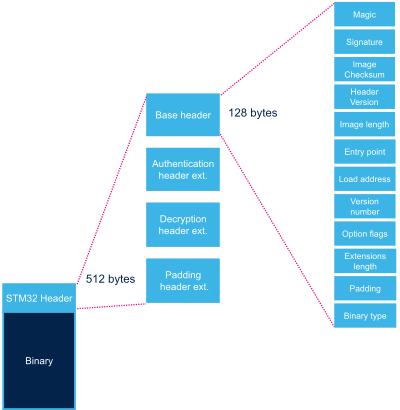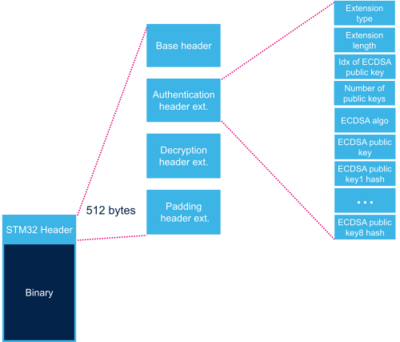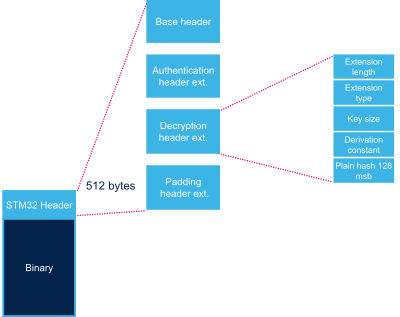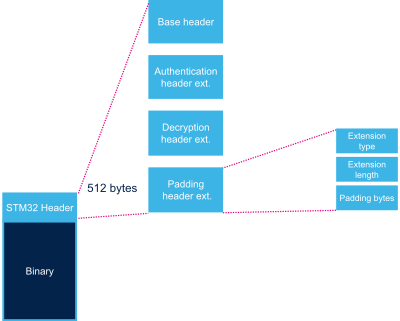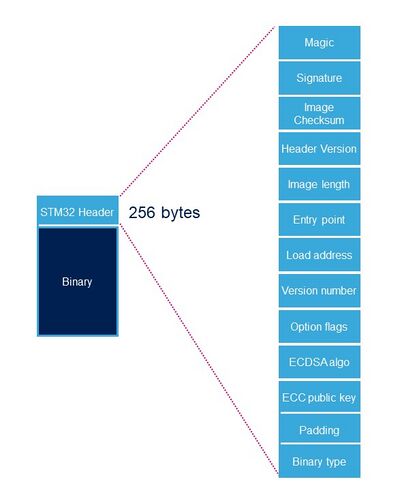The STM32 header is a STMicroelectronics header needed for binaries loaded by ROM code.
1. Description[edit source]
Each binary image loaded by the ROM code needs to include a specific STM32 header added on top of the binary data. This header includes mandatory and optional information: this second one is only needed for the authentication (STM32MP1 Series) and decryption (STM32MP13x lines ![]() ) processes.
) processes.
2. On STM32MP13x lines  [edit source]
[edit source]
2.1. Base header[edit source]
| Name | Length | Byte Offset [Note 1] | Description |
|---|---|---|---|
| Magic number | 32 bits | 0 | 4 bytes in big endian: 'S', 'T', 'M', 0x32 = 0x53544D32 |
| Image signature | 512 bits | 4 | ECDSA signature for image authentication[Note 2] |
| Image checksum | 32 bits | 68 | Checksum of the payload[Note 3] |
| Header version | 32 bits | 72 | Header version v2.0 = 0x00020000 Byte0: reserved Byte1: major version = 0x02 Byte2: minor version = 0x00 Byte3: reserved |
| Image length | 32 bits | 76 | Length of image in bytes[Note 4] |
| Image entry Point | 32 bits | 80 | Entry point of image |
| Reserved | 96 bits | 84 | Reserved |
| Version number | 32 bits | 96 | Image Version (monotonic number)[Note 5] |
| Option flags | 32 bits | 100 | b0=1: Authentication enabled[Note 6] b1=1: Decryption enabled.[Note 7] b31=1: Header padding enabled[Note 8] |
| Header extensions length | 32 bits | 104 | Sizes of header extensions enabled by option flags. |
| Padding | 20 Bytes | 108 | Reserved padding bytes[Note 9]. Must all be set to 0 |
- ↑ Unless expressed differently, the 32 bits values are stored in little endian.
- ↑ Signature is calculated from first byte of header version field to last byte of image given by image length field.
- ↑ 32-bit sum of all payload bytes accessed as 8-bit unsigned numbers, discarding any overflow bits. Used to check the downloaded image integrity when signature is not used (if b0=0 in Option flags).
- ↑ Length is the length of the built image, it does not include the length of the STM32 header.
- ↑ Image version number is an anti rollback monotonic counter. The ROM code checks that it is higher or equal to the monotonic counter stored in OTP.
- ↑ Enabling signature verification is mandatory on secure closed chips. Authentication parameters are stored in "Authentication header extension".
- ↑ When decryption is enabled, authentication is mandatory. Decryption parameters are stored in "Decryption header extension".
- ↑ This header padding extension is always used to have a fixed size of 512 bytes for the whole size of header + its extensions.
- ↑ This padding forces STM32 base header size to 128 bytes (0x80).
2.2. Authentication header extension[edit source]
This header extension contains parameters needed for authentication.
| Name | Length | Byte Offset[Note 1] | Description |
|---|---|---|---|
| Extension type | 32 bits | 0 | 4 bytes in big endian: 'S', 'T', 0x00, 0x02 = 0x53540002 |
| Extension length | 32 bits | 4 | Number of bytes of header extension = 340 |
| Public key index | 32 bits | 8 | Index of the public key to be used. |
| Public key number | 32 bits | 12 | Number of public keys in table = 8 |
| ECDSA algorithm | 32 bits | 16 | 1: P-256 NIST ; 2: brainpool 256 |
| ECDSA public key | 512 bits | 20 | ECDSA public key to be used to verify the signature.[Note 2] |
| Public key1 hash | 256 bits | 84 | Hash of (ECDSA Algorithm+Public key1).[Note 3]. |
| ... | ... | ... | Hashes of (ECDSA Algorithm+Public key), for key2 up to key7 |
| Public key8 hash[Note 4] | 256 bits | 308 | Hash of (ECDSA Algorithm+Public key8) |
- ↑ Offset is relative to header extension base. Unless expressed differently, the 32 bits values are stored in little endian.
- ↑ Public key is a point on the ECC curve. This field contains the two big numbers in big endian format corresponding to ECC Point coordinates x and y. (If these coordinates are extracted from a PEM public key file that only kept coordinates in a raw binary format, you shall remove the first byte "04" which is an asn1 tag ; for more info: RFC 5480).
- ↑ The Public Key hash computation is the SHA-256 of ECDSA Algorithm expressed in little endian, concatenated to the public key itself. The entry of the public key table referenced by the public key index is compared to the hash of the ECDSA algorithm and public key that are stored in the header.
- ↑ The table of public key hashes will be hashed with SHA-256 by the ROM code and compared to the Hash of Public Keys Hashes Table (PKHTH) that is stored in OTP.
2.3. Decryption header extension[edit source]
This header extension contains parameters needed for decryption.
| Name | Length | Byte Offset[Note 1] | Description |
|---|---|---|---|
| Extension type | 32 bits | 0 | 4 bytes in big endian: 'S', 'T', 0x00, 0x01 = 0x53540001 |
| Extension length | 32 bits | 4 | Number of bytes of header extension = 32 |
| Key size | 32 bits | 8 | Size of extension key (128 bits)[Note 2]. |
| Derivation constant | 32 bits | 12 | Constant used to derive decryption key from master key stored in OTP. |
| Plain hash | 128 bits | 16 | 128 msb bits of plain payload SHA256. |
2.4. Padding header extension[edit source]
| Name | Length | Byte Offset[Note 1] | Description |
|---|---|---|---|
| Extension type | 32 bits | 0 | 4 bytes in big endian: 'S', 'T', 0xFF, 0xFF = 0x5354FFFF |
| Extension length | 32 bits | 4 | Number of bytes of header extension = N + 8 |
| Padding bytes | N bytes | 8 | Padding bytes[Note 2]. |
3. On STM32MP15x lines  [edit source]
[edit source]
| Name | Length | Byte Offset | Description |
|---|---|---|---|
| Magic number | 32 bits | 0 | 4 bytes in big endian: 'S', 'T', 'M', 0x32 = 0x53544D32 |
| Image signature | 512 bits | 4 | ECDSA signature for image authentication[Note 1] |
| Image checksum | 32 bits | 68 | Checksum of the payload[Note 2] |
| Header version | 32 bits | 72 | Header version v1.0 = 0x00010000 Byte0: reserved Byte1:major version = 0x01 Byte2: minor version = 0x00 Byte3: reserved |
| Image length | 32 bits | 76 | Length of image in bytes[Note 3] |
| Image entry Point | 32 bits | 80 | Entry point of image |
| Reserved1 | 32 bits | 84 | Reserved |
| Load address | 32 bits | 88 | Load address of image[Note 4] |
| Reserved2 | 32 bits | 92 | Reserved |
| Version number | 32 bits | 96 | Image Version (monotonic number)[Note 5] |
| Option flags | 32 bits | 100 | b0=1: no signature verification[Note 6] |
| ECDSA algorithm | 32 bits | 104 | 1: P-256 NIST ; 2: brainpool 256 |
| ECDSA public key | 512 bits | 108 | ECDSA public key to be used to verify the signature.[Note 7][Note 8] |
| Padding | 83 Bytes | 172 | Reserved padding bytes[Note 9]. Must all be set to 0. |
| Binary type | 1 Byte | 255 | Used to check the binary type 0x10-0x1F: FSBL 0x30: Copro |
- ↑ Signature is calculated from first byte of header version field to last byte of image given by image length field.
- ↑ 32-bit sum of all payload bytes accessed as 8-bit unsigned numbers, discarding any overflow bits. Used to check the downloaded image integrity when signature is not used (if b0=1 in Option flags).
- ↑ Length is the length of the built image, it does not include the length of the STM32 header.
- ↑ This field is not used by ROM code.
- ↑ Image version number is an anti rollback monotonic counter. The ROM code checks that it is higher or equal to the monotonic counter stored in OTP.
- ↑ Enabling signature verification is mandatory on secure closed chips.
- ↑ Public key is a point on the ECC curve. This field contains the two big numbers in big endian format corresponding to ECC Point coordinates x and y. (If these coordinates are extracted from a PEM public key file that only kept coordinates in a raw binary format, you shall remove the first byte "04" which is an asn1 tag ; for more info: RFC 5480).
- ↑ The Public Key hash computation is the SHA-256 of ECDSA Algorithm expressed in little endian, concatenated to the public key itself. The resulting value is compared to the Hash of pubKey that is stored in OTP.
- ↑ This padding forces STM32 header size to 256 bytes (0x100).
